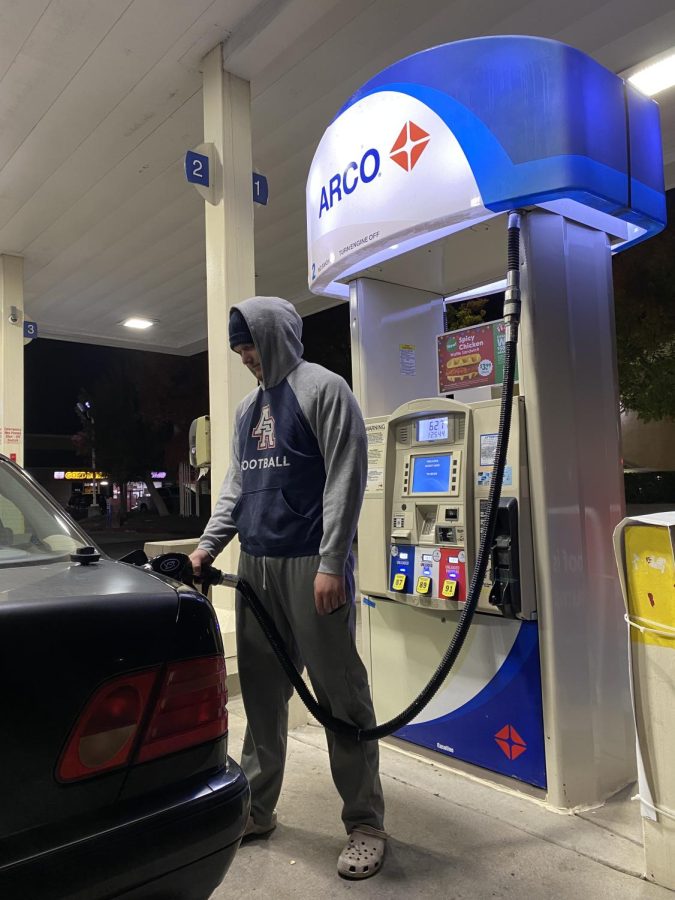Climbing gas prices affect choices made by students and staff at ARC
Many people have to make changes in their daily routine or spending, now that gas prices are constantly changing
Climbing gas prices are affecting the entire population. In fact, for months it has often been at the center of breaking news or even in the various everyday chats between friends.
To have a better understanding of why gas prices are climbing, we should take a step back and think about what is happening from a worldwide perspective.
Following the invasion of Ukraine, the United States imposed economic sanctions on Russia, which led to a rise in gas prices.
According to Charles Thomsen, professor at American River College, high prices are also the result of our capitalist system.
In fact, if we look at the records, we can notice how the oil and gas companies made record profits in only three months from July to September.
For instance, according to the information posted on the State of California website, Phillips 66’s profits jumped to $5.4 billion, BP posted $8.2 billion in profits and Marathon Petroleum had $44.48 billion in profits.
“The price of gas is set based on how much profit the oil and gas industry wants to make,” Thomsen said.
If we check the gas price right now, we will probably think that it’s lower compared to a few weeks ago. According to the American Automobile Association, in Sacramento the current average is $5.37 a gallon compared to a month ago when it was $6.29.
As a student-athlete at ARC, I think the government should take action and think about some plans that can help students get funds and deal with the climbing prices—or raise production to counter rising demand and help reduce supply shocks.
Even if prices are a little lower, they still influence some of the decisions made by students or staff at ARC. The constant thought of having to fill up the car in order to get to class or work influences how people decide to plan their day or use their savings.
We have to take into account that sometimes students don’t have time to work, because they want to focus on their degree or they are too busy with extracurricular activities, such as sports or clubs. They don’t have the funds to afford gas and many other things.
For instance, Edgar Montes, an ARC football player, drives every day to and from school for 15 miles each way and says he usually spends $90 every week to fill his tank.
“The gas prices affect what I can do in life because I have to choose whether I want to get gas or buy food,” Montes said. “I can never do both.”
This drastic change in gas prices forced people to change their habits and bring adjustments in their life.
Thomsen, for example, traded his gas car for an electric vehicle, now he can charge his EV instead of filling the tank.
“The cost of charging and driving an EV is about half the cost of an internal combustion engine car,” Thomsen said. “It would cost about $9 a day to drive a 40-mpg car to school, but only $2 to drive an EV.”
Students are forced to find a solution to save gas. I think we should work together as a community and try to make this issue less of a burden on our daily routine. Some students carpool or choose online classes.
Montes says he found carpooling to be a valid solution.
“Sometimes I will carpool with my teammates, especially if I have to drive twice in one day because of practice,” Montes said.
For Anamaya Matsuoka, an ARC student who drives to school four times a week for 30 mins just one way, carpooling didn’t work out.
Matsuoka had a hard time finding people to carpool with because a lot of her classmates don’t live near her area, so she tried to attend some classes online.
“I have thought about maybe taking a few online classes instead of so many in person,” Matsuoka said. “However, I find that being in person is a much more beneficial way for me to learn and pay attention.”
It can be hard for students and staff to adjust to their life, especially because these changes are depending on something that is rarely stable and that can climb or drop in one night and something they don’t have control over, such as gas prices.
Students’ and staff’s hands are tied, the only thing they can do is hope that gas prices will drop, as we are already beginning to see, and hopefully stay that way without any drastic change.










